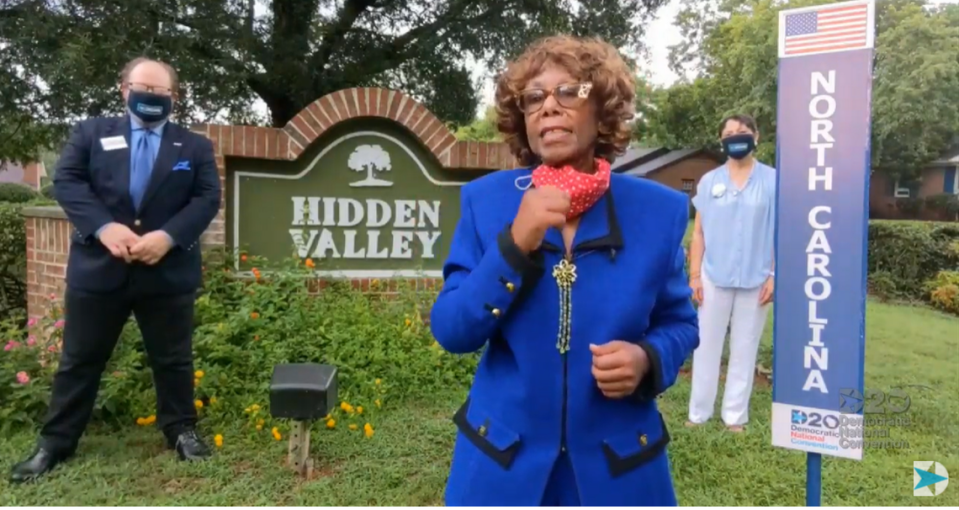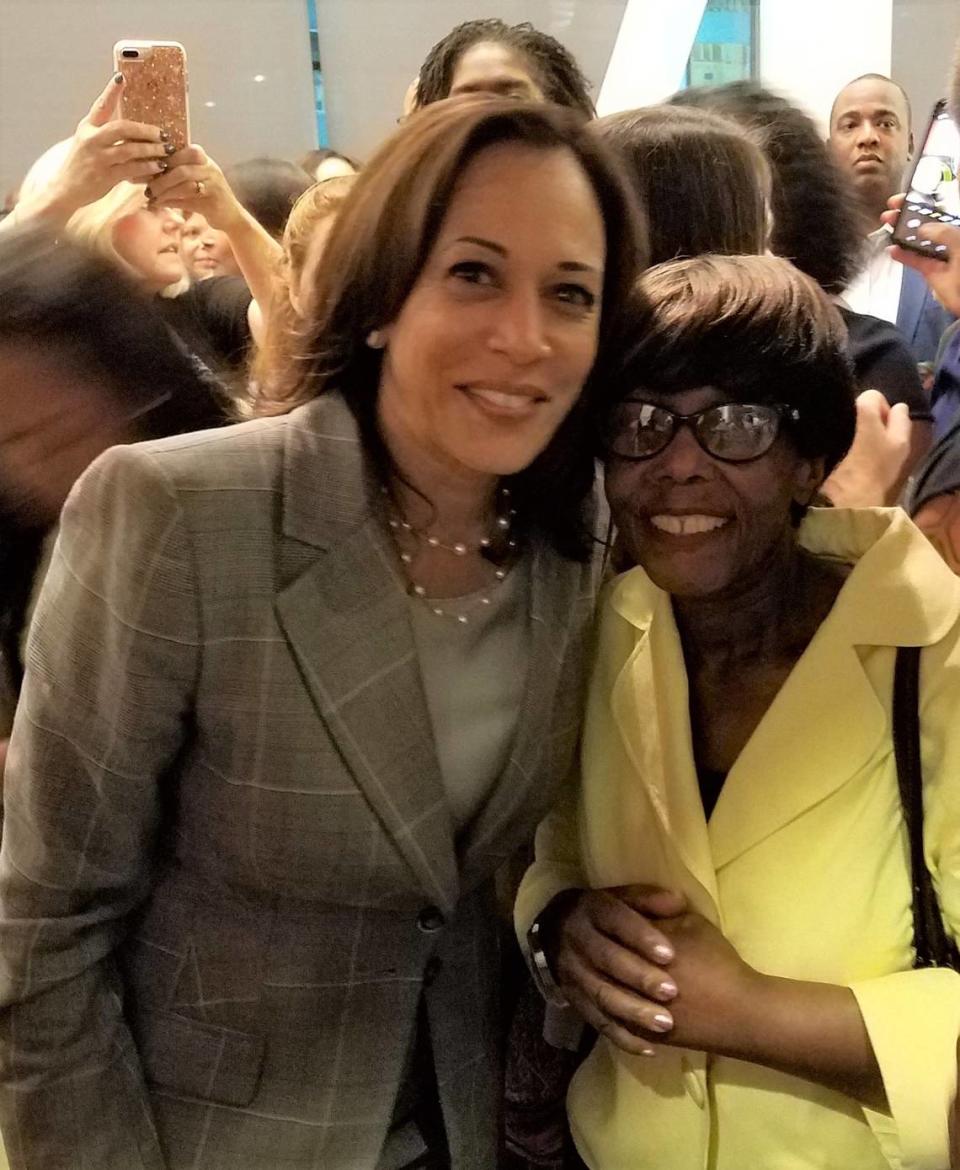‘I called her Mom.’ Charlotte Democratic Party leader, Cozzie Watkins, dies at 71
When former Charlotte City Council member Larken Egleston became ill at the 2016 Democratic National Convention in Philadelphia, he said Alista “Cozzie” Watkins went into “mother mode.”
Egleston was forced to miss the second half of the convention due to his sickness, he said, but Watkins and her close friend, Ann Newman, checked on him frequently and brought him all the supplies he needed while he was stuck in bed.
“I was stuck in Philly feeling miserable,” Egleston recalled. “These two women, who I knew I had a good relationship with … found time to take care of me and make sure I was OK. That’s something I always remembered and appreciated them for.”
In the seven years since the convention, Egleston said he didn’t see Watkins as much as he would have liked.
But Egleston visited Watkins during her final days at Atrium Health Mercy Hospital, he said. There, he had the opportunity to meet her son, A.J., for the first time, and develop a bond with a man who shared many of the same qualities as his mother.
“She referred to me as one of her sons, so that made us brothers,” Egleston said. “I think that unselfish nature that Cozzie had so ingrained in her, clearly she imparted to her son.”
Alista “Cozzie” Watkins died March 2. She was 71 years old.
A funeral service for Watkins will be held at Little Rock A.M.E. Zion Church, 401 N. McDowell St., on March 17 at 11 a.m.
A fierce advocate for Black women in politics
Watkins was a nurse, but she also served as the chair of the Democratic Party in the 12th District, which includes Mecklenburg County. Her involvement in politics included additional roles on the Charlotte Planning Commission, and president of the Democratic Women of Mecklenburg County.
By 2020, Watkins was a longtime fixture in the realm of Charlotte politics – but she became a national sensation during the Democratic National Convention that year.

Watkins delivered a speech from Charlotte’s Hidden Valley neighborhood as part of the DNC’s roll call, where she emphasized the importance of a particular subgroup within the Democratic Party.
“I’ve been doing this for a long time, so let me just be plain,” Watkins said during her address. “Black people, especially Black women, are the backbone of this party and if we don’t show up, Democrats don’t get elected.”
Her speech garnered thousands of views, and caught the attention of celebrities, like comedian Michelle Collins and Samantha Bee, host of Comedy Central’s “Full Frontal with Samantha Bee.”
But Watkins didn’t let that distract her from her goal to get more Black women involved in politics – something that she pursued years before she went viral.
Aisha Dew, who was the first Black woman to serve as chair of the Mecklenburg County Democratic Party in 2011, said Watkins was “always present” to give her advice on how to lead.
“When you’re in a position of leadership, you’re oftentimes drinking water from a firehose from the beginning,” Dew said. “It’s great to have a person who’s there who can help support and advise you, and Cozzie was really good for that.”
Watkins knew that Black women were critical in helping Democrats win elections, Dew said, and she thought having more of them in positions of leadership could advance the party.
“To be at the table, you can help steer the trajectory of the party from the inside and show up as a voter, but also show up as leader,” Dew said. “I think it was really important to her for Black women’s voices to be heard.”
Democratic Women of Mecklenburg County President DonnaMarie Woodson, described Watkins as a “loving and wonderful mentor.” Watkins was the first Black woman to hold Woodson’s current position.
While involved with the party, Watkins advocated for issues such as affordable housing, health care and voting rights – and she believed that Black women could lead the efforts to find solutions to those problems, Woodson said.
“Black women have really been at the forefront of the energy and getting out to vote, and being just very strong within the Democratic Party,” Woodson said, adding that the group was overlooked in the party for many years. “A big passion of hers was making sure everyone had a seat at the table.”

Watkins was also a key piece in helping Black women get elected to local and state-level positions.
Rickye McKoy-Mitchell, Mecklenburg County’s longest-serving district court judge, said Watkins was her campaign manager and “surrogate” when she ran for a seat on the North Carolina Court of Appeals in 2016.
“She was also on my case, which she knew I hated,” McKoy-Mitchell joked, “but that meant she was going a lot of different places, and speaking on my behalf. She made sure I had contacts throughout the state.”
McKoy-Mitchell would often drive hundreds of miles around the state with her husband during her campaign to attend events, she said, and Watkins would check on her every step of the way.
“When you have folks who are campaign managers, it’s really about the election, and they forget about the person involved, and that person could have all kinds of other life events going on,” said McKoy-Mitchell. “She never lost sight of that.”

‘I called her “Mom”’
Though her official title was “campaign manager,” McKoy-Mitchell said she and Watkins became “like sisters” after the 2016 election.
Watkins and her son would often attend events hosted by McKoy-Mitchell, from ugly Christmas sweater parties to family gatherings.
“If we had an event, she knew she was always invited,” McKoy-Mitchell said. “When she was with you, you would feel like she genuinely cared about you.”
Egleston, who now works as the district director for U.S. Rep. Jeff Jackson, called Watkins a “great sounding board” during his tenure on the Charlotte City Council from 2017-2022. He said Watkins always offered a “level-headed perspective” and guidance on issues he needed help with.
“She treated people that she cared about like family, and you felt that way back about her,” said Egleston. “I called her ‘Mom’ and she called me ‘son.’ And I have come to find out that there were a number of people that she had that type of relationship with.”
One of those people was former Charlotte City Council member Billy Maddalon.
Maddalon’s initial impression of Watkins when they first met in 2008 was that she was “the cutest thing” he had ever met and “full of really good energy,” he said. And it didn’t take long before they were close friends.
As a white, gay man, Maddalon assumed he knew a lot about “progressive politics,” but Watkins educated him on the issues that the Black community faces within the Democratic Party, he said. In return, he taught Watkins about how to network with the LGBTQ community.
“People just felt comfortable around her, and so she could get people at a table that might not ordinarily sit at a table together,” Maddalon said. “She had a real talent for bringing people together, and I’d like to think that she taught me a little bit about how to do that, too.”
Watkins was a regular at the Maddalon house, where she would enjoy a glass of wine with him and his husband, Brooks, he said. The couple had 19 foster children over the years, and Watkins made it a point to develop a relationship with all of them.
“She always used to tell our kids, ‘You know, you’re a lottery winner, baby. You won the lottery. You have people who love you,’” Maddalon said. “I think all of of us are lottery winners in some ways. The question is what were we’re going to spend the winnings on.”
Despite a career spent working for the Democratic Party, Egleston said Watkins wanted nothing more than to see the entire city thrive.
“She cared about every person in this community, and she cared about making it a better place for people who live here,” said Egleston. “I hope that her legacy inspires other to live in a similar way.”

